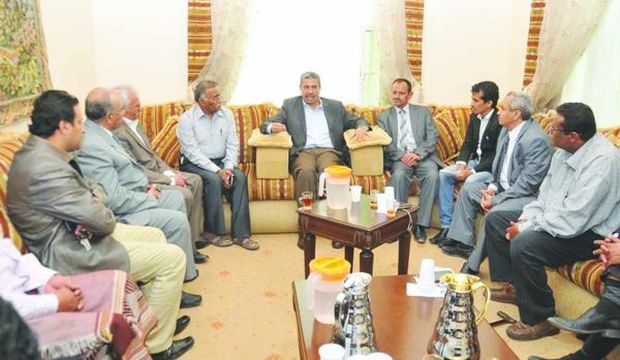
Yemeni Prime Minister Khaled Bahah sits with his aides at his residence in Yemeni capital Sana'a, on March 15, 2015. (Asharq Al-Awsat)
Sana’a, Asharq Al-Awsat—Yemen’s Houthi movement released Prime Minister Khaled Bahah and all cabinet members on Monday, ending an almost two-month house arrest imposed on the ministers by the Shi’ite movement now in de facto control of Yemen, a Yemeni government spokesman said.
In a statement posted on his Facebook page on Monday, Bahah said the step was a gesture of goodwill but added that neither he nor any of his cabinet members had the desire to resume their duties.
“This comes as an expression of sincere good intentions . . . [the government] confirms it does not desire to return to its duties in light of the exceptional circumstances,” Bahah wrote.
After its successful takeover of the capital Sana’ last year, the Iran-backed movement placed several government officials, including President Abd Rabbuh Mansur Hadi, Bahah, Foreign Minister Abdullah Al-Saidi, and Defense Minister Gen. Mahmoud Al-Subaihi under house arrest.
The group bolstered its grip on Yemen by issuing a controversial constitutional declaration that dissolved parliament, with the movement also setting up committees to run the country’s affairs, which, along with its control of state institutions in Sana’a, gave it effective control of the country.
UN-sponsored talks between Yemen’s political factions have stalled as several political parties pulled out in protest against the Houthis’ refusal to release officials or withdraw their militias from Sana’a.
Hadi managed to flee to Aden in February, where he embarked on forming a Gulf-backed government to counter the Houthis. Defense Minister Subaihi also escaped his house arrest, earlier this month, joining President Hadi in Aden.
The surprise move contrasts with comments Bahah made to Asharq Al-Awsat from his besieged residence on Sunday when he said Yemen’s political crisis was unlikely to end soon.
Speaking to Asharq Al-Awsat from his southern Sana’a residence, where he was detained by the Houthis, Bahah said that the central government in Yemen was “ill and will remain so for a long time.”
The 50-year-old PM called on Yemen’s youth to act in order to reverse what he said were the “abnormal” circumstances the country was currently experiencing.
Bahah made the comments during talks with several political and military leaders from the Tihamah region. He was cautious not to elaborate on political developments or on the circumstances of his detention.
In comments to Asharq Al-Awsat, sources close to Bahah said the Houthis were “annoyed when [Bahah] made statements to the press or expressed his position and therefore they are extending his house arrest.”
The Houthis would lift the house arrest on Bahah, the source maintained, should he guarantee he would not divulge details about the circumstances of his detention.
Bahah praised the efforts being made by Yemen’s political parties that he said have managed to make their presence felt during the crisis, in contrast to the higher political leadership who suffer from chronic problems.
Although looking pale, Bahah was in good health and a jovial mood.
During the meeting, the 50-year-old politician touched on the political and economic woes in the country. He said several regions in the country had received little attention while the government focused most of its efforts on the “center,” Sana’a. “The center is selfish as usual but people should show interest in their [country’s different] regions,” he said.
Bahah also discussed the need for injecting fresh blood into Yemen’s political parties.
The Houthis have tightened security measures in the upscale southern district which is home to the residences of several senior officials, including the son of former president Ali Abdullah Saleh and Yemen’s ambassador to UAE Ahmed Saleh.
